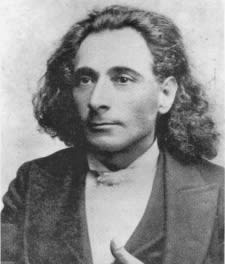Land of My Birth – Even before Naftali Imbar knew how to read and write, the young boy composed rhymes and asked his friend to write them down. As a youth, he amazed all the other people with his detailed knowledge of the Tanach, the Talmud, and the Zohar. He was also known for his sharp tongue and his witty poems. When he was eighteen, his father died, and from that time on he was restless and wandered from place to place. Here is how he describes his life:
“I was born on Shabbat Chanukah in the year 5617 (1856). Until the age of seven, I was mute. I wrote my first poem at the age of nine. At about the age of twenty I wrote the song “Austria” in honor of the Emperor, and Avraham Krochmal liked it so much… that he printed it in a special booklet. Then I went through Austria, Hungary, and Serbia. In Romania I was a teacher, and Baron Moshe Waldberg was very close to me. In his house, I wrote “Hatikvah.” In Istanbul I was a peddler. In 5642 (1882) I traveled with Olifant to Eretz Yisrael. When he passed away, I moved to Egypt, and from there to London… I traveled from New York to San Francisco and from there to Denver.”
Imbar was in Eretz Yisrael at the beginning of the “First Aliyah” and he was greatly impressed by the growing movement. He continued to write Hebrew songs about the homeland, full of love for the land, and he published them in a book called “Barkai.” Imbar was a pioneer among the authors of the First Aliyah, and his poems were welcomed with excitement by all the “Lovers of Zion.” The poem “Hatikvah” was especially popular, and it became the hymn of the pioneers. The song went through several revisions, until it finally reached its current version. Imbar claimed that he wrote Hatikvah in the new town of Rishon Letzion. He remained in Eretz Yisrael for four years, and as noted above he then continued to wander. In the above summary of his life, Imbar did not mention everyplace that he was, since he was even in India. Here is what he wrote from there:
“There are few Jews here, and the missionary network is spread far and wide. A missionary approached me and tried to entice me too, but I spit in his face. I am not particularly righteous, but I will never change my name and my faith, which are rooted on golden pillars.”
Imbar did not show special respect for prominent and wealthy people, even though more than once he was dependent on their support and good will. As opposed to the normal approach, he did not speak to them in the royal third person but rather as a friend. One time he spoke to the Chief Rabbi of Moscow in this way, and in reply to a criticism he ‘: “Is the rabbi greater than the Master of the Universe? When we recite a blessing to G-d, we say, `Blessed are you…'”
Here is how Imbar was described when he was in the United States, the last station on his wanderings:
“The author of Hatikvah could be compared to Shlomo Molcho – he was involved in Kaballah and mysticism, he tried to learn the innermost secrets. He was negligent in his needs, he did not utilize his great talent, and he never attempted to create something great. He lived as a free bird, grabbing a grain here and a grain there. He sang when the spirit moved him and he was quiet when the spirit was silent. He wrote a few poems a year, that is all … In the morning he did not know where he would sleep at night, but he was not worried. He knew that he would find friends on the street or in a coffee house, and Judge Salzberger would send him checks promptly… He will be remembered for the good… And when he died, he was placed deep in the ground, so that Hatikvah would rise to ever greater heights…”
The State of Israel acknowledged its debt to the man who had written its national anthem. A short time after the country was established, his remains were brought for eternal resting in the land of Zion and Jerusalem.
Source: R. Binyamin, “Families of Authors”, among other sources. Reprinted with permission from Zomet Institute (www.zomet.org.il).
The words of this author reflect his/her own opinions and do not necessarily represent the official position of the Orthodox Union.
